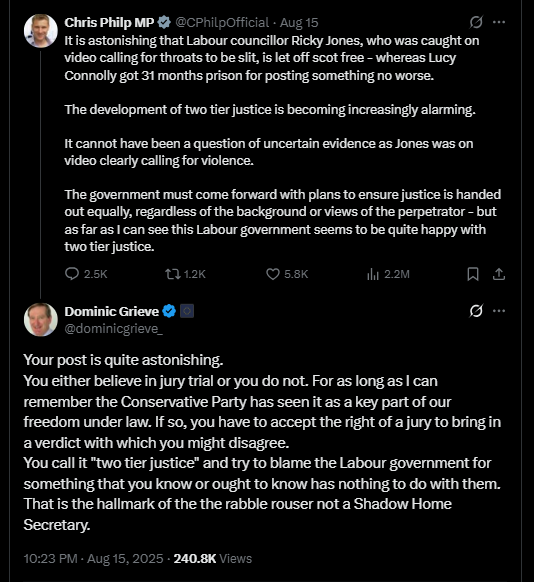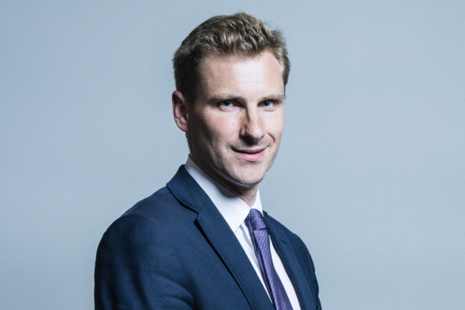After his week in France looking at deportations and small boat crossings, at the tax payer’s expense, Chris Philp thought he’d try his hand at legal commentary. It went about as well as you’d expect
Chris Philp tries a culture-war take. Dominic Grieve replies with a lesson in how jury trials work.
Chris Philp has made a career out of shouting loudly about problems he neither understands nor solves. The image above shows him railing against so-called “two tier justice”, only to be schooled by former Attorney General Dominic Grieve.
Philp tried to spark outrage over a jury decision, claiming Labour were “happy with two tier justice” because a Labour councillor escaped prison while another individual received 31 months. Grieve’s response was blunt and accurate. If you believe in trial by jury, you accept jury verdicts even when you dislike them. To imply otherwise undermines a cornerstone of British democracy.
This is not just about one embarrassing tweet. It is part of a bigger pattern. Chris Philp talks a big game yet delivers little.
The Online Safety Bill: Philp’s Signature Failure
Philp’s most high-profile ministerial role came when he served as Minister for Tech and the Digital Economy between September 2021 and July 2022, right in the middle of the Online Safety Bill’s development. He championed early versions of the legislation and fronted it at public events.
At the time, he sold the Bill as the UK’s chance to lead the world on online regulation. Yet the Online Safety Act that finally received Royal Assent in October 2023 arrived after delays and political wrangling, and satisfied almost no one. Free-speech campaigners called it overreaching. Victims’ advocates called it weak. Companies were left baffled, and ordinary users were none the wiser about what is or is not allowed.
Yes, the Act was a collective effort that spanned several ministers and departments. But Philp’s fingerprints were on the early stages where confusion and contradiction set the tone. His DCMS tenure was defined by grandstanding announcements and muddled explanations that even his own backbenchers struggled to follow. The outcome was a bloated law that pleased no side and failed the clarity test.
A Catalogue of Ineffectiveness
- Crime and policing. The rhetoric was tough. Results were not. Serious offences rose while conviction rates fell.
- Digital policy. As Tech Minister he produced briefing lines so unclear that MPs questioned whether he understood his own legislation.
- Immigration and courts. Backlogs worsened while he found time to rage about culture-war distractions on social media.
The pattern is constant. Noise without delivery. Outrage without outcomes.
The Rabble Rouser, Not the Statesman
Grieve’s rebuke lands because it is true. Philp behaves like a rabble rouser, not a serious politician. He does not build, he does not fix, and he does not deliver.
Britain faces real challenges in crime, justice and digital safety. We need leaders who understand the issues and can shape effective solutions. Instead, we have Chris Philp, who would rather stir outrage on Twitter than do the hard work of governing.
Conclusion
Chris Philp wants to be seen as a heavyweight. His record shows a man better at generating noise than achieving results. If the Conservative Party is serious about rebuilding credibility, it should ask a simple question. Why is someone with such a threadbare record still being put forward as a voice of authority?
Until that changes, Philp will remain what he has always been. A loud minister, but an ineffective one.




